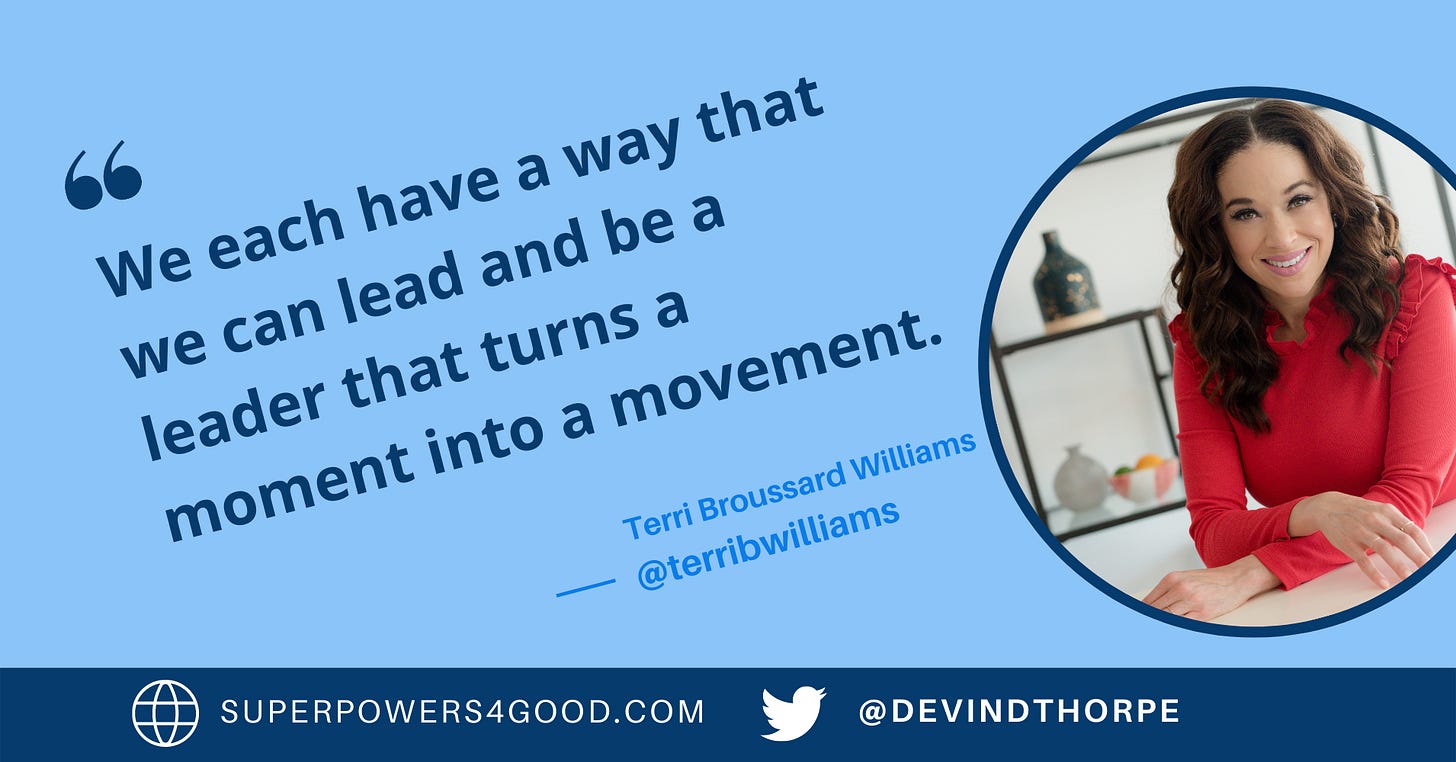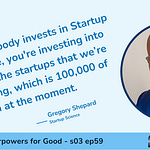Devin: What do you think of as your superpower?
Terri: My background is in television reporting and producing. And I just truly learned how to listen and how to be reflective of the communities that you're part of and tell that story so that others can be inspired.
Terri Broussard Williams, the author of Find Your Fire, is a movement maker. Her day job as a lobbyist gives her experience fighting for change.
“I am a lobbyist, so I passed a lot of smoke-free laws. Sometimes they were in small cities, other times they were in cities as big as Dallas, Texas,” Terri says. “But we each have a way that we can lead and be a leader that turns a moment into a movement.”
Terri’s early career was in television news. She draws on that experience in all she does today.
“We're all wired to be afraid of failing,” she says, explaining why she wrote the book. “If we can break things down in a way that makes it really easy peasy and tangible, then we feel confident enough to take that first step.”
Terri developed in the book a four-step plan for creating a movement. Before you begin step one, Terri offers this profound insight. You must commit, “I'm going to love myself no matter what happens.”
To drive home the connection with becoming a changemaker for good, Terri starts each of the four steps with a word that begins with C.
Here are the four steps for building a movement:
Cause: “You have to understand your why or your cause,” Terri says. You need to have a powerful reason to do hard things.
Collective: “The second step is truly building a collective. You want people that are around you that are going to hold you accountable, that are going to keep you intellectually honest about what you're doing,” Terri says. “But you also want people around you that will build that table to make it very long and very wide and diverse. So that collective should be the people that are going to be your accountability partners, your allies, your coalition partners.”
Communication: “A movement is not going to move unless people know that you are working on it—unless they know your why, what you're trying to change and achieve,” she says. “So, I help people figure out very in a very simple manner how you communicate that movement.”
Change: “You have to get your hands dirty and do the work in order to see change.”
People who follow her fire starter model are building movements. She shares the story of one as an example:
Alex was in a PhD program and read Find Your Fire as part of a paper she had to do, and her professor told her, ‘This is not an academic book. You need to pick another one.’ And she said, ‘No, this is helping me create the change that I want to create.’ She founded this beautiful international dance company that is rooted in really empowering people and allowing people to overcome trauma. It's a beautiful mission. So very long story short, she dropped out of this PhD program and is dedicating all of her time to really getting this nonprofit off the ground. And just recently, she sent me this podcast interview where she's beautifully, beautifully explaining her cause and her why, and she talks about the collective or the board that she's built, and she's communicating on the podcast what they're doing, and she's talking about the change they want to create and how they need the public to be a part of it. Creating followership, truly getting that movement moving. So I love it so much.
In all her work, Terri draws on lessons and skills she learned in television, including listening, reflecting and storytelling.
How to Develop Storytelling As a Superpower
The keys to being a good storyteller begin with listening and reflecting what you hear.
Television is a high-pressure business. “I began as a young news producer at the age of 23, working overnight in Columbia, South Carolina,” Terri says. “I am the person deciding [whether] you send the camera crew out at two a.m. to cover a story or not and having to justify that decision at nine a.m. when the boss came in!”
That pressure helped her learn lessons indelibly. She reflects on those lessons and encourages others to draw on their own experiences. “You just have to look at every lesson that you learn throughout your journey and how it’ll get you to that next spot.”
One lesson she learned was the need to accept defeat when it comes. “Let’s celebrate what we know we could do better, and we will do better next time. But let’s talk about what we learned and how we empowered others along the way.”
She has a caution for others she guides and mentors. “Never emulate me. Just be yourself.” She’s convinced you can be a better you than you can be another Terri.
“Every day, we have the opportunity to create the world’s most important movement,” she says. “And that’s the one inside of us: how we choose to live our life, how we choose to show up in the world, how we choose to make things around us better.”
Your lived experiences should shape your ability to tell stories. If you combine your unique voice and perspective with good listening and reflecting, you too can make storytelling a superpower.
















